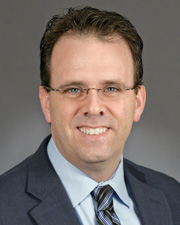Local employment law preemption bill clears another committee
A bill that would be roll back local sick-leave laws in Minneapolis and St. Paul continued its path through House committees Wednesday.
Sponsored by Rep. Pat Garofalo (R-Farmington), HF600 would prohibit local governments from adopting ordinances that regulate minimum wage, paid or unpaid leave, work scheduling, or other work benefits or working conditions. The bill would preempt ordinances passed on or after Jan. 1, 2016 – including sick-leave initiatives enacted last year in the state’s two biggest cities.
Garofalo said his purpose is unified labor law across Minnesota, and he hopes proposed appropriations for the Bureau of Mediation Services and the Labor Standards division of the Department of Labor and Industry would attract support from DFLers, including Gov. Mark Dayton.
The House Government Operations and Elections Policy Committee approved the bill on a 10-6 party-line, roll-call vote, sending it to the House Ways and Means Committee.
Its companion, SF580, sponsored by Sen. Jeremy Miller (R-Winona), awaits action by the Senate Jobs and Economic Growth Finance and Policy Committee.
The hearing drew 32 public testifiers, including 22 bill opponents.
DFL members unsuccessfully offered 11 amendments that would have carved out exceptions so local governments could pass ordinances requiring paid leave in certain situations, such as an employee with a sick child or to an employee with a contagious disease who works with food.
Rep. Mike Freiberg (DFL-Golden Valley) said the bill’s preemption of city ordinances regarding working conditions might unintentionally preempt local regulation of such things as cigarette or e-cigarette smoking, or what employees of adult-entertainment businesses do.
Garofalo also had a warning to opponents about unintended consequences.
“This may not cut the way you think it does,” he said while predicting if the bill does not become law, local labor laws that are “not progressive” could pass, particularly in cities that allow voters to approve ordinances by initiative and referendum.
Related Articles
Search Session Daily
Advanced Search OptionsPriority Dailies
Ways and Means Committee OKs proposed $512 million supplemental budget on party-line vote
By Mike Cook Meeting more needs or fiscal irresponsibility is one way to sum up the differences among the two parties on a supplemental spending package a year after a $72 billion state budg...
Meeting more needs or fiscal irresponsibility is one way to sum up the differences among the two parties on a supplemental spending package a year after a $72 billion state budg...
Minnesota’s projected budget surplus balloons to $3.7 billion, but fiscal pressure still looms
By Rob Hubbard Just as Minnesota has experienced a warmer winter than usual, so has the state’s budget outlook warmed over the past few months.
On Thursday, Minnesota Management and Budget...
Just as Minnesota has experienced a warmer winter than usual, so has the state’s budget outlook warmed over the past few months.
On Thursday, Minnesota Management and Budget...
